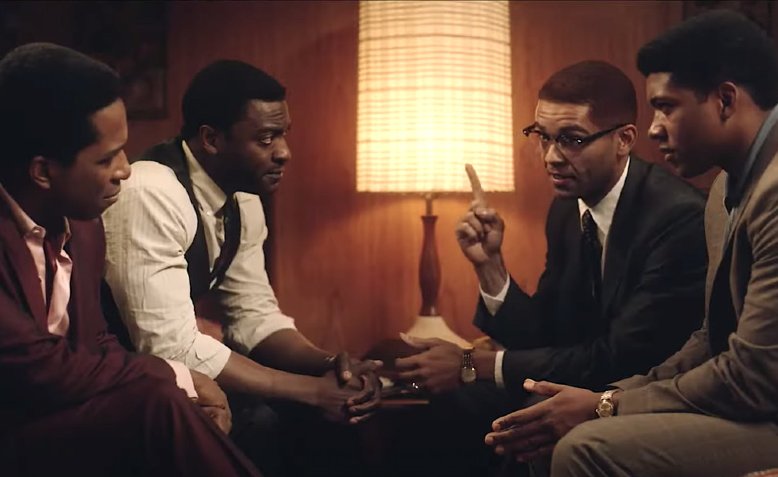 Scene from One Night in Miami
Scene from One Night in Miami
One Night in Miami provides a vivid depiction of segregated America and an exploration of the meaning of Black liberation, finds Yonas Makoni
It’s 1964 and the US civil rights movement is at a crossroads. The Civil Rights Act, which banned segregation, was soon to come into law, ending the first stage of the movement. In the following years, the movement would fragment into numerous different strains, as activists debated how many steps had to be taken to achieve black liberation.
It is in this context that Regina King’s One Night in Miami (written and based on a play by Kemp Powers) tells the fictionalised story of a real-life meeting between four friends in a hotel room: singer Sam Cooke, activist Malcolm X, American football player Jim Brown and boxer Cassius Clay (Muhammad Ali).
The four men are at a crossroads too. Brown has just beaten a world record and is thinking about retiring from football to pursue a career in Hollywood; Cooke is becoming a successful cross-over star with white audiences and runs his own record label; and Malcolm is about to break with Nation of Islam (NOI) and its leader Elijah Muhammad to start his own organisation. Both Malcolm and Cooke would die within a year of the events of the film.
Clay, however, has just beaten Sonny Liston to become the world heavyweight champion, and this victory and its immediate aftermath provides the backdrop for the story. After the fight, Malcolm brings them all to the small hotel room in which the majority of the action takes place.
The film centres on a heated discussion between Malcolm and Cooke, who clash on the meaning of black power and liberation. This debate is meant to stage the internal arguments of the civil rights movement, and also the doubts and guilt of many socially mobile black people (including the writer himself) about the responsibilities of success.
Cooke takes an entrepreneurial approach to the question. Liberation means the freedom for black people to advance themselves in society without depending on white superiors. An individual helps others by helping himself, thereby bridging racial divides and paving the way for others to follow in his footsteps.
Malcolm, on the other hand, believes that liberation is a collective, rather than individual, struggle. Instead of seeking advancement within an oppressive society, black people should seek to build a different one. And Cooke, Brown and Clay have a duty to engage in this struggle and use their status for its benefit.
In short, should we seek gains within the system, or dismantle it? The film does not attempt to resolve this debate, leaving each character to choose their own path and grapple with the question individually. This leaves the feeling that the debate is secondary and that all four characters, in their own way, succeeded in advancing black pride and unity.
As Powers explains in an interview, “it’s important to remember all four of these men want pretty much the same things but have different ways of going about it.” While true, this implicitly privileges Cooke’s perspective, viewing collective advancement as something achieved through individual success, as a demonstration of ‘black excellence’.
From a socialist perspective, however, collective struggle is the only way of achieving liberation and, as long as the system of oppression remains in place, individual gains are severely limited.
Meanwhile, Malcolm’s militancy is frequently ridiculed by the other characters, even by Clay whose own convictions are portrayed as half-hearted. The film is disparaging towards the foot soldiers of the National of Islam, portraying them as robotic, manipulable and unintelligent – failing to appreciate how (despite the bizarre and often atrocious beliefs of the NOI), their political organising in black communities was also a source of empowerment.
The film brilliantly reconstructs the oppressive atmosphere of the Jim Crow South however. The casual, reflexive racism of the white characters and Malcolm’s distress over his persecution by FBI agents gives a sense of how oppressive American society was (and is) towards even the most successful black people and how high the stakes of the debate must have felt. The tension created by restricting the action to a small room in a segregated hotel compounds this feeling.
While politically flawed from a socialist perspective, One Night in Miami is a thought-provoking and gripping account of the meeting of these four icons at a time of massive political turbulence.
One Night in Miami is available to watch on Amazon Prime now
Join Revolution! May Day weekender in London
The world is changing fast. From tariffs and trade wars to the continuing genocide in Gaza to Starmer’s austerity 2.0.
Revolution! on Saturday 3 – Sunday 4 May brings together leading activists and authors to discuss the key questions of the moment and chart a strategy for the left.

